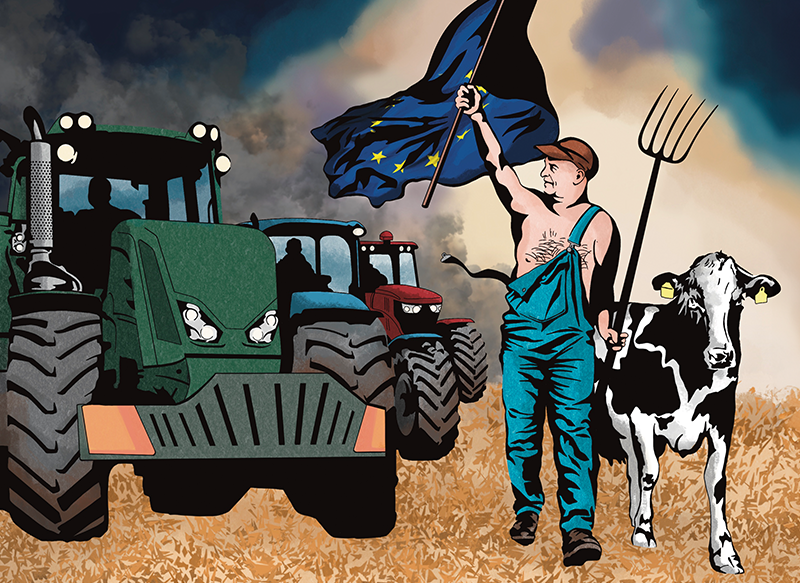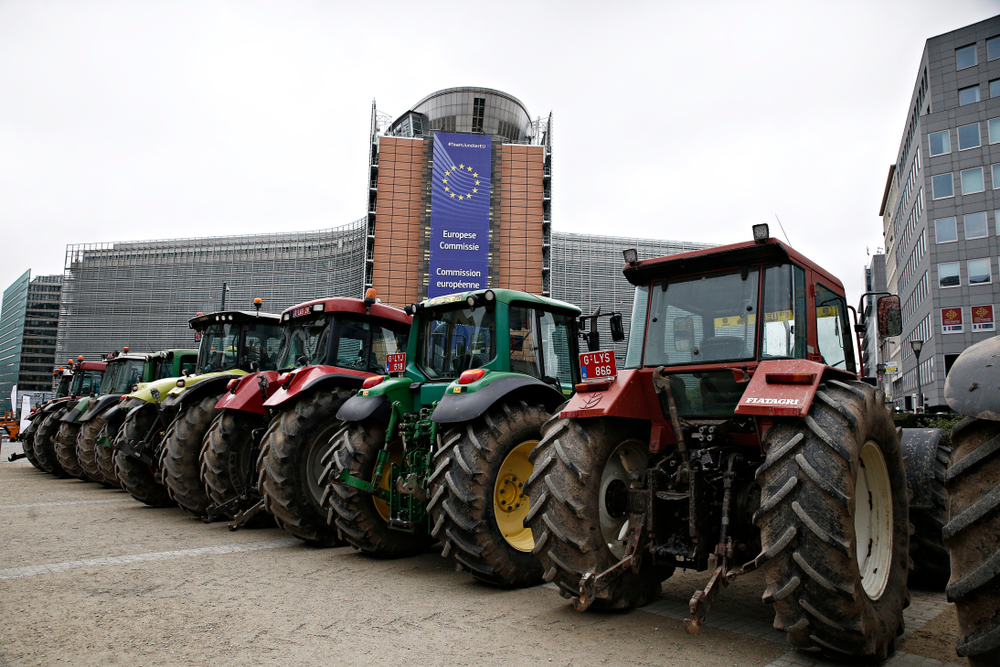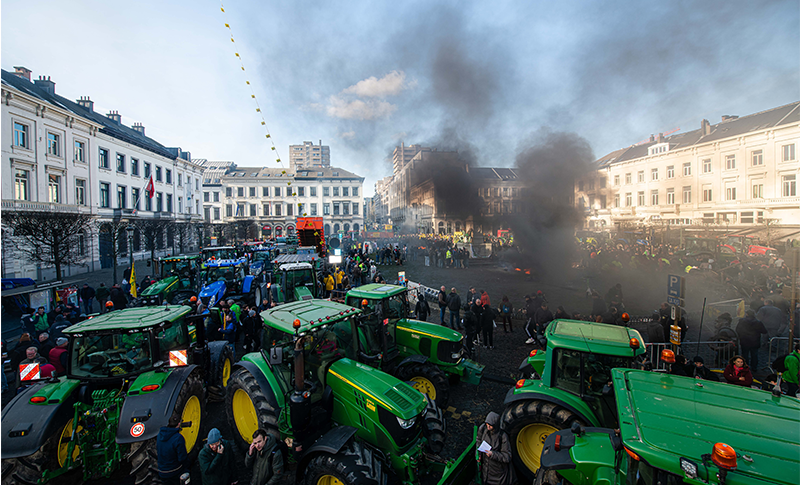Farmers are protesting all over Europe at the moment, from the A50 motorway in Beekbergen to Brussels, Berlin and Paris. What is going on, what have international farmers’ protests got in common with the Dutch protests, and how can the sector calm down again? Han Wiskerke, professor of Rural Sociology, explains. ‘The lack of a vision for the future is disastrous.’
The Netherlands has been in the grip of heated farmers’ protests for three years now, in response to the threat of a reduction in the livestock population due to the nitrogen crisis. Recently, farmers have also started protesting in countries including Germany, France, Belgium, Italy, Romania and Spain. The Rural Sociology chair group has been following the developments with particular interest: the group studies agricultural dynamics and regional rural development. That is why we are asking their chair holder Han Wiskerke to explain what is going on with the Dutch and European farmers’ protests.
The German farmers were protesting about diesel, the French about pesticides, the Spanish about water and the Dutch about nitrogen. But is it also essentially about the same thing?
‘The common denominator in farmers’ protests, regardless of geography or time period, is basically always the wish for a secure livelihood. Farmers take action because of that fundamental question, first of all in the present day: will I still be able to make a living with my farm? Security in the longer term can also be an issue that spurs farmers to protest: will I be able to carry on farming and will my children be able to take over the farm? Another factor, although it is less important, is the feeling of being restricted in their entrepreneurial spirit.’
Do farmers have a point with their concerns?
‘They have been subjected to a lot of interventions in recent years to do with the environment and nature. They have to cope with a huge amount of paperwork that sometimes verges on the bizarre, with measures where you can’t really see what purpose they serve.’
There is so much paperwork, sometimes verging on the bizarre
‘Take calendar farming: if farmers fail to harvest their potatoes by 1 October, they are not allowed to spread as much manure the following year. That still applies in unfavourable years such as last year, with a wet spring, dry summer and soaking wet autumn. Farmers find this incomprehensible. They feel trapped by an unreliable government.’
Is that why the protests seem to be getting more heated?
‘In part, although I think the fury of the current protests is mainly due to the lack of prospects. There were farmers’ protests in previous decades too, but at least then there was a shared view on where agriculture should be heading. In the 1960s and 1970s at any rate, the course in the Netherlands was clear: agriculture had to grow to provide goods for export. That was also the frame that effectively kept environmental legislation at bay, or implemented in watered-down form, for years. The ministry supported this too, because it was assumed technical solutions would be found in the end. That turned out to be a miscalculation. Which is why we now have the threat of drastic measures after all, at a time when farming incomes are under pressure and there are no clear prospects. The lack of a vision for the future is disastrous.’
Many Dutch farmers are millionaires, on paper at any rate. Surely farming incomes are not suffering that much?
‘There are big differences. We did quite an extensive study on this topic in 2020. It turned out then that only 25 per cent of the farmers got all their income from farming. The vast majority earn a significant proportion of their income from other farm-related activities such as cafes or recreation, or even a second job. And while all respondents were dissatisfied with the revenue from agriculture, nearly all farmers with additional sources of income were satisfied with the family income. Some farmers have broadened their business activities purely for economic reasons. That is painful. This was never their intention in choosing to become a farmer.’
You mean it undermines their identity as producers of food? Like their slogan: no farmers, no food?
‘Not like that. In my opinion, it’s Big Agribusiness that has been emphasizing the identity of farmers as food producers and promoting “no farmers, no food” because it’s convenient to them. I don’t hear farmers talk much about “producing food” even though I grew up in an arable farming family and as a scientist I’ve interviewed a lot of farmers.’
The Netherlands as an export country was the frame that effectively kept environmental legislation at bay for years
‘Farmers are mainly interested in their crops or animals and the expertise needed to deliver good products and get a good yield. They identify above all with an entrepreneurial spirit, being outdoors and working with nature.’
Is the term ‘farmer’ due a revision?
‘That is already happening to some extent. People are increasingly talking about the valuable ecosystem services farmers could deliver and get paid properly for, even if such discussions often use negative terms such as “handouts” and “taxpayers’ money”. Which is unjustified, I think. You never hear that when talking about road builders say, even though it is essentially the same thing: businesses are paid to deliver a service that is of value to society as a whole. In both cases, it’s important for the government to show it is a trustworthy partner. What happened recently in Gelderland, where the provincial authority threatened to cancel a 30-year scheme for nature-inclusive agriculture after only one year, is quite unacceptable. You only need a few incidents like that and their trust has gone for good.’
Isn’t the uncertainty lasting too long — the programme for tackling the nitrogen problem has been on the cards since May 2019? Won’t farmers find it all too much?
‘We haven’t researched this specifically. But I do think offering certainty is an important issue and there is real disregard for the mental well-being of farmers and their families. For years, farmers have had a higher suicide rate than other professions. Being responsible for a farm that has often been in the family for generations puts huge pressure on them. You don’t want to be the one to give it up. If none of the children want to take over the farm, that is a sad situation too but at least you can explain it to the outside world. That’s different if you can’t cope any more. Farmers experience that as failure, as if you have squandered the inheritance you got from your parents, grandparents and preceding generations. That is an enormous pressure and is still something people don’t talk about.’
What do you think will happen next?
‘I find it difficult to say, in part because agricultural policy has been driven by a “dig your heels in” mindset for years. That is happening now too: the EU’s Green Deal has been watered down and the Netherlands is still dithering about its nitrogen measures. It is political opportunism that seems to offer breathing space but in fact is only postponing the inevitable. Neither the politicians nor the farming sector gain from this because it only increases the need to take drastic measures later on. There is absolutely no clear vision on what course to take. That applies to the agricultural sector too, where it seems the loudest voices get listened to most, at the expense of the silent majority. In that regard, I was pleased to see serious talks with organizations such as Caring Farmers and Farmers of the Future, and their Green Farming plan, in the lead-up to the Agricultural Agreement. These are groups who do have a vision and who realize things need to change.’
Energy
At present, energy production is the fastest growing source of income for farmers. As of the start of this year, there is a virtual ban on solar panels in fields, but barn roofs full of solar panels and the lease of land for wind turbines still offer ‘very profitable returns per square metre’, as Wiskerke puts it.

 ‘The fury of the current protests is mainly due to the lack of prospects.’ Illustration Valerie Geelen
‘The fury of the current protests is mainly due to the lack of prospects.’ Illustration Valerie Geelen 


Nice article! But I am wondering about the study from 2020 she is referring to when saying “We did quite an extensive study on this topic in 2020. It turned out then that only 25 percent of the farmers got all their income from farming.” I could not find it only, is there a chance of sharing it?
We carried out this study in collaboration with Agrio, one of the main publishers of agrarian magazines in the Netherlands, primarily as input for a special Christmas magazine edition they wanted to publish at the end of 2020 about future perspectives for Dutch agriculture. This was a ‘members-only’ magazine and is not publicly available. A press release about some of the results of this survey was published by WUR (in Dutch): https://www.wur.nl/nl/nieuws/landbouwbedrijven-hebben-steeds-meer-bronnen-van-inkomsten.htm. A scientific paper based on this survey is currently being finalized. If you want to know more about the results of this survey, please contact me via email.
Thank you for the information!